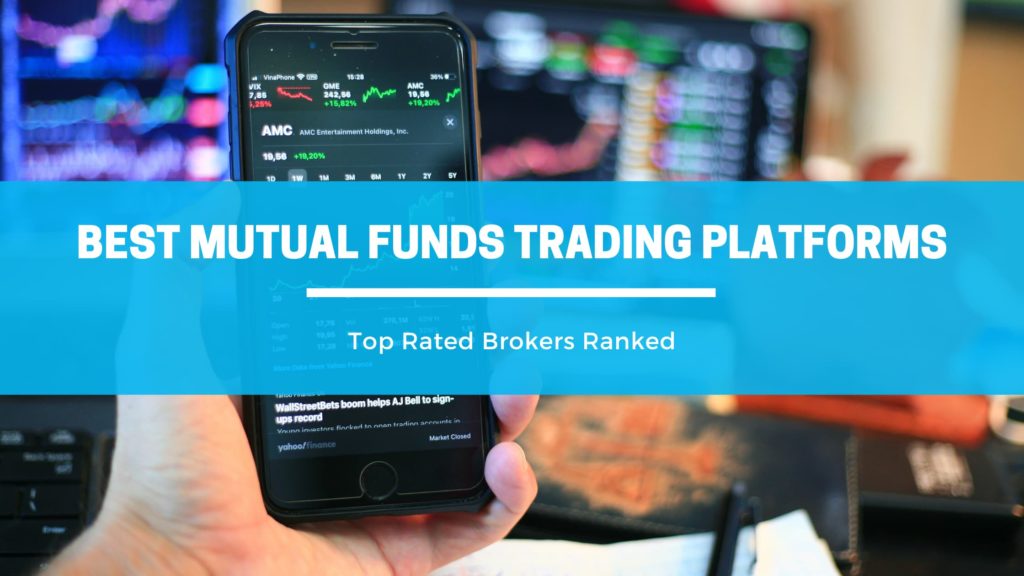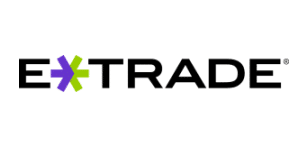Mutual funds are often seen as one of the safer methods some investors use to capitalize on their money. But what are they and who are the best brokers to use for mutual funds?
We’ve rounded up some of the most popular mutual fund trading platforms available to retail clients today. When comparing them, we’ve looked at expense ratios and whether they are actively or passively invested. If you’re still not clear on the topic, stick around until the end of the article where we’ve put together a useful FAQ section to explain mutual funds in more detail. You should also read our guide on the top online brokers and trading platforms.
Here are our top picks for the Best Online Brokers for Mutual Funds:
We’ve looked at some of the biggest names in Mutual Fund investing today. We examined each platform in terms of service fees, fund types, customer service, and more. Make sure you fully understand how these brokers work before investing your money with them.
- Interactive Brokers – Best Mutual Funds Broker Overall
- Vanguard – Low Fee Mutual Funds Broker
- Fidelity – Large Selection Mutual Funds Broker
- Ally Invest – 3900+ No Transaction Fee Mutual Fund Broker
- Charles Schwab – Low Cost Mutual Funds Broker
- e*Trade – Great Mutual Funds Broker
- TD Ameritrade – Good Selection Mutual Funds Brokers
1. Interactive Brokers
Interactive Brokers (IBKR) serves a wide range of clients, from institutional investors to retail traders. Their firm has some of the best financial experts in the business.
One of the best things about IBKR is that its massive range of mutual funds is available to international investors. They offer over 45,000 mutual funds worldwide, most of which are no-load funds.
Some investors have criticized IBKR for having very high fees for low-value accounts.
- Account Minimum: $0
- Pricing: $0 no-transaction fee funds, 3% of value up to $14.95
- Best For: 17,000 no-transaction-fee mutual funds
| Pros | Cons |
|---|---|
| Wide range of applicable mutual funds | |
| Excellent track record throughout the years | |
| Access to no-load funds |
2. Vanguard
Vanguard is the brokerage firm that first introduced the world to index (passive) investing. They are very attractive to newer investors as they offer free financial advice to help customers pick out the best fund to suit them.
Vanguard has some of the best expense ratios of any broker for their funds. Because their funds are all passively invested, there is no load charge for opening an account.
Vanguard also has some of the best-performing portfolios out there. Over the last few decades, they have consistently outperformed their competition.
| Pros | Cons |
|---|---|
| Competitive fee structure | Fewer funds on offer |
| Varied fund types | Only available to US citizens |
| High returns |
- Account Minimum: $0
- Pricing: Free for no-transaction and family funds, $0 – $20 for others
- Best for: Low-Costs
3. Fidelity
Fidelity is another highly rated mutual fund broker that has been around for decades. They are well known for providing expert financial advice and basing their investment decisions on sound research and data.
Investors looking for actively managed funds would do well to invest with Fidelity. They have consistently had some of the best actively managed funds for decades. They also offer passively managed funds, but there are fewer options.
Many of their funds have no minimum investment amount so it’s a great place to start if you have little capital.
| Pros | Cons |
|---|---|
| Great actively managed funds | Fund information is difficult to make out |
| All funds are low expense ratio, no-load funds | Lacking customer support |
| Investors use expert analysis to beat the market |
- Account Minimum: $0
- Pricing: Free for no-transaction and Fidelity funds, $49.95 for buy and $0 to sell on non-Fidelity funds
- Best for: Offers 4 zero-fee index funds
4. Ally Invest
Ally Invest is a newer firm than some of the industry giants on this list. But that doesn’t make them inferior by any means.
Ally Invest markets itself as cultivating a community of financial wellness. To do this, they post a large number of educational resources to potential investors. It’s worth checking out some of their blog posts even if you don’t want to invest with them.
They offer fewer mutual funds than bigger brokerages, but they are well managed and consistently earn profits.
| Pros | Cons |
|---|---|
| Lots of educational resources | Customer support only available during office hours |
| Passively managed fees are inexpensive | Fewer funds than competitors |
| Varied account types |
- Account Minimum: $0
- Pricing: $9.95 on no-load funds
- Best for: Commissions are cheap
5. Charles Schwab
Charles Schwab offers a more boutique portfolio than large brokers like Vanguard or Fidelity.
They have a selection of useful tools to aid shareholders to get the most from their investment. They have Target Date funds, where investors can choose the desired investment period and Schwab will find the best portfolio to match their needs.
They are a full-service brokerage, so they are a bit more expensive than other brokers, but they offer more facilities in return.
| Pros | Cons |
|---|---|
| Highly customizable mutual fund features | More expensive than other brokers |
| Useful tools to calculate investment requirements | Fewer funds on offer |
| Full-service features |
- Account Minimum: $0
- Pricing: $0 on non-transaction fee funds, $49.95 on other
- Best for: Wide Variety of funds
6. E-Trade Financial
E-TRADE provides professionally managed, diverse funds to their shareholders. They pride themselves on supplying highly flexible accounts with few limitations on investment periods and amounts.
They separate their funds into three tiers based on their volatility: conservative, moderate, and aggressive.
In the past, shareholders complained about prohibitive expense ratios. In response, E-TRADE cut their commission fees drastically. They are now one of the cheapest brokers for mutual funds available.
| Pros | Cons |
|---|---|
| Well designed mobile app keeps track of your investment | No consolidated account options |
| Low minimum investment for mutual funds | Just over 1,000 funds on offer |
| Flexible account terms |
- Account Minimum: $0
- Pricing: $0 on non-transaction fee funds, $19.95 on no-load transaction-fee funds
- Best for: Wide Variety of funds
7. TD Ameritrade
TD Ameritrade was bought by Charles Schwab in 2019. They operate as an independent broker from their parent company and cater to a different niche. TD Ameritrade has thousands of funds to choose from.
Ameritrade has a list of tools that they offer their clients, such as fund screeners to match investors with their ideal funds; or a specially built compare fund tool.
Although many of their funds are no-load-funds, some of them do carry a heavy front-end load cost. Be careful to double-check exactly which type of fund you’re investing in.
| Pros | Cons |
|---|---|
| Lots of useful tools for investors | Low-interest rates on uninvested returns |
| Diversely invested Mutual Funds | |
| Access to real-time data on investments |
- Account Minimum: $0
- Pricing: $0 on non-transaction fee and load funds, $49.99 on no-load funds
- Best for: Wide Variety of funds
What are Mutual Funds?
Mutual funds are an investment option aimed at providing a diverse portfolio of professionally managed securities. Mutual funds invest in multiple, diverse securities. Each fund can invest in anywhere between 20-200 securities.
Investors buy shares in funds rather than buying individual stock shares. They get a share of the fund proportional to their investment capital and earn dividends based on the performance of the fund.
Mutual fund investments are meant to be long-term and are often used for retirement funds. One of the principles behind mutual funds is that the assets are hedged. So poor performance of one stock does not mean an overall downward trend for the fund.
Mutual funds differ from investing in stocks in that buying a single mutual fund share gives the investor access to hundreds of securities.
If a stock investor wanted access to a hundred different stocks, they would have to make a hundred separate purchases. They would have to pay a commission on each of these purchases.
Why Buy Mutual Funds?
Mutual funds give their investors access to a wide range of securities with a single fund share. This diversifies the investor’s portfolio and tends to keep the investment safe from sudden downtrends in individual stocks.
Another reason that investors could be enticed by mutual funds is the promise of professional management. Funds have managers who often control the investments of the fund like stock brokers, trying to capitalize on the trends in the stock market.
Mutual fund investors can also choose what kind of fund they’d like to invest in. Some funds are geared towards investing in stocks that promote social or environmental good. Some even invest solely in alcohol, tobacco, and gambling.
Mutual funds are best when used as long-term investments for the future. Because they are so diversified, daily dividends are relatively low. But the fund’s performance over a long period will add up to a sizable retirement package.
Pros and Cons of Mutual Funds
Like any form of investing, mutual funds have their ups and downs. We’ve gone over a few of the most pertinent aspects of mutual funds here:
Pros
- Investors can easily diversify their portfolio with only a single fund share. Diversified investments are more protected in sudden fluctuations in the economy and stock market.
- Mutual funds are professionally managed by experts. Even passively traded funds are overseen by fund managers to mitigate losses. Often, the professional managers also act as financial advisors to their clients.
- Compounded investments mean your initial share position can increase year over year. Many mutual funds have the option to reinvest dividends directly into the fund. This is provided as part of the fund’s services and does not require an extra stock purchase.
Cons
- Mutual funds can be more expensive than other long-term investment options. Actively invested funds charge a higher expense ratio to pay for their expert investors. Often, these investors do not outperform stock indexes.
- Many investors feel that mutual funds do not provide the same level of control as other investments. This means investors cannot capitalize on trends of individual stocks to turn large profits and must wait on smaller, consistent returns.
- Dishonest fund managers have been caught abusing their position. Some managers use techniques like churning and window dressing to take advantage of their clients.
Direct Mutual Funds vs Regular Mutual Funds
Mutual funds are a complex system of investing with a lot of jargon. “Direct” and “Regular” mutual funds are concepts that a lot of people may not be familiar with. We’ll go over them briefly here.
A Direct Mutual Fund is bought directly from the management company. Investors can buy shares in a direct mutual fund from the company’s website or even over the phone. A direct mutual fund does not go through any third-party providers or distributors.
Regular Mutual Funds are purchased through some kind of intermediary, usually a broker. The intermediary party charges a commission on the sale to make money. This means that Regular Mutual Funds have a higher expense ratio.
Where to Buy Mutual Funds Online
Before the advent of the internet, investors would have to go directly to their broker’s office and ask them to buy mutual fund shares on their behalf. Fortunately, technology has made this job a lot more simple for the average investor.
Asset Management Companies (AMCs) now allow investors to buy shares directly from the company website by simply linking a bank or credit card.
Many investment firms allow investors to buy shares from them directly. These firms come in all sizes from publicly-traded giants to boutique investors. These firms all offer a variety of funds to invest in.
Some investment companies have adapted their traditional structure for the information age. Mutual fund managers like Vanguard have added fully-fledged financial services to their offerings. These firms tend to push investors to invest in their in-house funds.
Another place potential investors can buy mutual funds is from brokers like Ally Invest or E*TRADE. These are often the most expensive type of funds because the broker adds a commission to the initial investment.
Mutual Funds Fees 101
Many investors are concerned over the fees that Mutual Funds charge their investors. At first glance, the fee structure of these funds can seem complicated and opaque. But once you understand the terminology that fund managers use it becomes clearer.
We’re here to explain how Mutual Fund fees work, and what you can expect to pay for your Mutual Fund shares.
Firstly, it’s important to understand where the Mutual Fund fees are paid from. Most often, the operating expenses for the fund are paid out of the capital investment. If the fund was profitable in that year, the fee will be deducted from the dividends before being paid to the investors.
If the fund did not make a profit, the operating fees will come out of the assets of the fund. This unfortunately means that the dollar amount invested in the fund will decrease. The operating fees are typically between 0.5% and 1.25% of the total investment each year.
Shareholders with Regular Mutual Funds will have to pay either a front-end or back-end Sales Load. A Sales Load is a commission paid to the broker or consultant who sold those shares.
Front-end sales loads are paid when the fund shares are purchased by the shareholder. Back-end sales loads are paid when the shareholder sells their shares. Fund managers should only charge a sales load once.
Direct fund shareholders have to pay purchase fees. These are similar to sales loads but are paid directly to the mutual fund rather than to a broker.
Mutual funds have all sorts of different fees that they may hold their shareholders accountable to. Before investing in a fund, check out their prospectus which will detail exactly what shareholders are charged for and where that money goes.
How To Pick A Mutual Fund Broker?
Brokers that offer Mutual Funds are diverse in what they offer their shareholders and the fees they charge. We’ll go over some of the most important aspects to consider before investing with a broker.
To find out about how a particular mutual fund operates, check out its prospectus. This is a published description of the fund made by the provider.
Expense Ratios
Expense ratios describe the annual cost of maintaining the investment by the shareholder. Funds charge a percentage of shareholders’ investments every year. These charges are normally between 0.5% and 1.25% of the investment.
Shareholders should also consider if their fund has a sales load. This means that a percentage of the investment is paid to the investment broker as a once-off payment.
Full-Service Vs. Discount Mutual Fund Brokers
Full-service brokers invest money on their client’s behalf. They provide their clients with services like wealth management and financial advice. Full-service brokers charge more in commission to pay for the expert advice.
Discount mutual brokers may have some of the facilities of full-service brokers. They charge less in service fees because they offer fewer options to their clients. Discount brokers often trade automatically and follow the stock market index.
Investors might be tempted to go with Discount brokers because of the lower charges, but this is not necessarily the right decision. Full-service brokers are more pricey, but shareholders get more out of the deal.
Consider both options carefully before committing to a broker.
Mutual Fund Type
There are different types of mutual funds available to potential investors. The type of fund determines where it is invested as well as the way dividends are paid out.
For example, Money Market funds are short-term investments that are involved with Forex markets and government bonds. These funds are better for people looking to keep their money invested for a short time, such as planning for a vacation.
Balanced funds are medium-term mutual funds that invest in both stocks and money markets. The goal is to protect investors against fluctuations in entire markets.
There are hundreds of more options available to shareholders, each one of them catering to a specific shareholder need.
Active Vs. Passive Funds
One of the most contentious issues in mutual fund investing today is the discussion around active and passively invested mutual funds.
Active funds employ traders to buy and sell shares for the fund. By employing experts funds aim to outperform the stock markets and give their shareholders a better return on investment.
Passive funds simply follow the market index. These funds follow the trends of entire stock markets such as the S&P 500 or JSE. Passively invested funds will mimic the performance of the stock market as a whole.
Passively invested funds are cheaper than active ones. They do not employ traders who need to be paid so their shareholders save money. Actively traded funds are capable of outperforming passive ones, but this is a very rare occurrence.
FAQ
Should You Buy Mutual Funds Through a Broker?
Brokers often get an unfair reputation in trading circles. While you certainly don’t need a broker to buy shares in Mutual Funds, there are some advantages to it. If your broker is honest and above-board, they can help you choose from the thousands of options the fund that is best for you. If you’re financially savvy enough, you probably don’t need a broker to help you out.
What is a Blue Chip Fund?
Blue Chip Funds are widely considered to be the best possible funds to invest with. It is a term used to describe funds that are invested with the most robust and high-performance stocks like Alphabet and Amazon. Blue Chip funds are desirable because they have shares of these stocks which means they tend to have a higher return. They are also able to survive market stresses because they have more valuable stocks.
Do Mutual Fund Brokers Get Paid?
In short, yes. Fund brokers have to get paid which is why direct funds are cheaper to purchase.
Are Mutual Funds Safe?
Yes. In terms of long-term investing, mutual funds are by far the safest for most investors. By and large, mutual funds tend to outperform most other forms of investment because they are so diverse. Passively managed funds tend to be safer than actively managed ones because they follow market indices. But that doesn’t mean that there are no risks involved.
What are the Top 5 Mutual Funds?
Morgan Stanley Multi Cap Growth, Shelton Green Alpha Fund, Morgan Stanley Instl Growth Portfolio, Trans America Capital Growth, Taylor Frigon Core Growth.
What is the Best Time To Buy Mutual Funds?
Now. Mutual Funds are different from stock investments because they are by and large long-term positions. Many retirement funds are held in mutual funds. The best way to increase capital in mutual funds is to invest early and let compound interest do what it does best.
Are there any hidden fees in Mutual Funds?
Ideally no. If your broker is above board, they won’t hide any fees from you. All of the brokers on this list declare their fees. Be sure to read through the fund’s prospectus thoroughly before investing as it will divulge any fees that shareholders are accountable to.
Are Mutual Funds Tax-Free?
No. Depending on which country and region you are investing in, the laws around Mutual Funds may vary. Most territories subject Mutual Funds to some form of Capital Gains Tax.
What Is The Minimum Amount To Invest in a Mutual Fund?
This depends on your broker and your fund. Some funds need a minimum deposit as high as $10,000. Others have no minimum deposit. It’s good to start with a sizeable amount, as the early investment will determine your returns which greatly affect your shares’ long-term gains.







